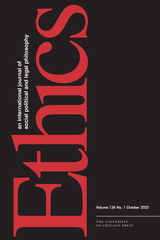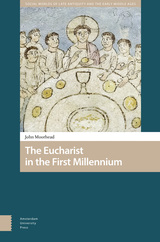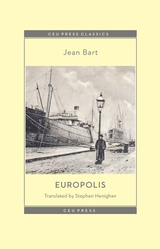6 books about Planting
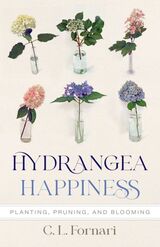
Hydrangea Happiness
Planting, Pruning, and Blooming
C. L. Fornari
Brandeis University Press, 2026
A comprehensive, easy-to-use, illustrated guide to hydrangeas for novice gardeners and experienced horticulturists alike.
With large, long-lasting flowers that range from showy pinks to heartbreaking shades of blue, hydrangeas are captivating, popular plants. Yet gardeners often find themselves flummoxed by the challenge of blooming these fickle flowers.
Writer, radio host, and gardening consultant C. L. Fornari (also known as The Garden Lady) simplifies the cultivation and care of the six most popular species of hydrangeas in this practical, clear, and accessible guide. Hydrangea Happiness explains the difference between varietals and tells how and where they can successfully grow and in which soils and conditions they thrive. In addition to sharing essential information, Fornari addresses myths and misinformation and fields questions about cultivating these popular plants. Punctuated with catchy rhymes and beautiful photographs, this book makes the road to Hydrangea Happiness easy, successful, and fun.
With large, long-lasting flowers that range from showy pinks to heartbreaking shades of blue, hydrangeas are captivating, popular plants. Yet gardeners often find themselves flummoxed by the challenge of blooming these fickle flowers.
Writer, radio host, and gardening consultant C. L. Fornari (also known as The Garden Lady) simplifies the cultivation and care of the six most popular species of hydrangeas in this practical, clear, and accessible guide. Hydrangea Happiness explains the difference between varietals and tells how and where they can successfully grow and in which soils and conditions they thrive. In addition to sharing essential information, Fornari addresses myths and misinformation and fields questions about cultivating these popular plants. Punctuated with catchy rhymes and beautiful photographs, this book makes the road to Hydrangea Happiness easy, successful, and fun.
[more]
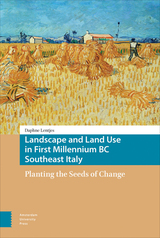
Landscape and Land Use in First Millennium BC Southeast Italy
Planting the Seeds of Change
Daphne Lentjes
Amsterdam University Press, 2016
This book offers a comprehensive overview of landscape and land use in southeast Italy in the first millennium BCE. Using the most up-to-date techniques, it combines archaeobotanical and archaeozoological data with information from excavations, field surveys, and ancient written texts to place the relationship between people and landscapes in a broad geographical and chronological framework. It also confronts questions of food habits, the scale and organisation of agricultural production, the influx of Greek and Roman colonists, and the effects of globalisation on local and regional land use.
[more]
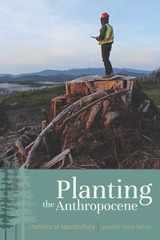
Planting the Anthropocene
Rhetorics of Natureculture
Jennifer Clary-Lemon
Utah State University Press, 2019
Planting the Anthropocene is a rhetorical look into the world of industrial tree planting in Canada that engages the themes of nature, culture, and environmental change. Bringing together the work of material ecocriticism and critical affect studies in service of a new materialist environmental rhetoric, Planting the Anthropocene forwards a frame that can be used to work through complex scenes of anthropogenic labor.
Using the results of interviews with seasonal Canadian tree planters, Jennifer Clary-Lemon interrogates the complex and messy imbrication of nature-culture through the inadequate terminology used to describe the actual circumstances of the planters’ work and lives—and offers alternative ways to conceptualize them. Although silvicultural workers do engage with the limiting rhetoric of efficiency and humanism, they also make rhetorical choices that break down the nature-culture divide and orient them on a continuum that blurs the boundaries between the given and the constructed, the human and nonhuman. Tree-planting work is approached as a site of a deep-seated materiality—a continued re-creation of the land’s “disturbance”—rather than a simplistic form of doing good that further separates humans from landscapes.
Jennifer Clary-Lemon’s view of nature and the Anthropocene through the lens of material rhetorical studies is thoroughly original and will be of great interest to students and scholars of rhetoric and composition, especially those focused on the environment.
Using the results of interviews with seasonal Canadian tree planters, Jennifer Clary-Lemon interrogates the complex and messy imbrication of nature-culture through the inadequate terminology used to describe the actual circumstances of the planters’ work and lives—and offers alternative ways to conceptualize them. Although silvicultural workers do engage with the limiting rhetoric of efficiency and humanism, they also make rhetorical choices that break down the nature-culture divide and orient them on a continuum that blurs the boundaries between the given and the constructed, the human and nonhuman. Tree-planting work is approached as a site of a deep-seated materiality—a continued re-creation of the land’s “disturbance”—rather than a simplistic form of doing good that further separates humans from landscapes.
Jennifer Clary-Lemon’s view of nature and the Anthropocene through the lens of material rhetorical studies is thoroughly original and will be of great interest to students and scholars of rhetoric and composition, especially those focused on the environment.
[more]

Planting the Garden
An Annotated Archival Bibliography of the History of Women in Manitoba
Mary Kinnear
University of Manitoba Press, 1987
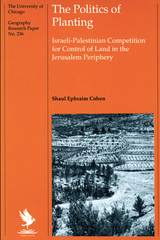
The Politics of Planting
Israeli-Palestinian Competition for Control of Land in the Jerusalem Periphery
Shaul Ephraim Cohen
University of Chicago Press, 1993
On the open landscape of Israel and the West Bank, where pine and cypress forests grow alongside olive groves, tree planting has become symbolic of conflicting claims to the land. Palestinians cultivate olive groves as a vital agricultural resource, while the Israeli government has made restoration of mixed-growth forests a national priority. Although both sides plant for a variety of purposes, both have used tree planting to assert their presence on—and claim to—disputed land.
Shaul Ephraim Cohen has conducted an unprecedented study of planting in the region and the control of land it signifies. In The Politics of Planting, he provides historical background and examines both the politics behind Israel's afforestation policy its consequences. Focusing on the open land surrounding Jerusalem and four Palestinian villages outside the city, this study offers a new perspective on the conflict over land use in a region where planting has become a political tool.
For the valuable data it presents—collected from field work, previously unpublished documents, and interviews—and the insight it provides into this political struggle, this will be an important book for anyone studying the Israeli-Palestinian conflict.
Shaul Ephraim Cohen has conducted an unprecedented study of planting in the region and the control of land it signifies. In The Politics of Planting, he provides historical background and examines both the politics behind Israel's afforestation policy its consequences. Focusing on the open land surrounding Jerusalem and four Palestinian villages outside the city, this study offers a new perspective on the conflict over land use in a region where planting has become a political tool.
For the valuable data it presents—collected from field work, previously unpublished documents, and interviews—and the insight it provides into this political struggle, this will be an important book for anyone studying the Israeli-Palestinian conflict.
[more]
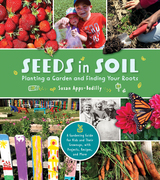
Seeds in Soil
Planting a Garden and Finding Your Roots
Susan Apps-Bodilly
Wisconsin Historical Society Press, 2022
Take learning outdoors and empower young readers to plant their own gardens while digging deeper into related science and history lessons in this “soil to supper” book designed for kids and adults to use together. Packed with hands-on activities, fun projects, and fresh recipes, this colorful gardening guide provides opportunities for kids to observe, explore, and ask questions while engaging their
natural curiosity about nature. Seeds in Soil includes all the details to start planting and growing, whether working with a whole yard, a community or school garden, or just a balcony.
Chapters feature advice for selecting the seeds and tools to get started; ideas for planning and being creative in the garden; and tips for harvesting, storing, and cooking with fresh produce. Written by a second-grade teacher, the book includes engaging lessons about the science of climate, soil, and pollinators; and connections to history through the stories of First Nations and immigrant gardeners. Told through the author’s family stories and experience, Seeds in Soil will get kids having fun in the garden while digging, planting, growing, and finding their roots.
natural curiosity about nature. Seeds in Soil includes all the details to start planting and growing, whether working with a whole yard, a community or school garden, or just a balcony.
Chapters feature advice for selecting the seeds and tools to get started; ideas for planning and being creative in the garden; and tips for harvesting, storing, and cooking with fresh produce. Written by a second-grade teacher, the book includes engaging lessons about the science of climate, soil, and pollinators; and connections to history through the stories of First Nations and immigrant gardeners. Told through the author’s family stories and experience, Seeds in Soil will get kids having fun in the garden while digging, planting, growing, and finding their roots.
[more]
READERS
Browse our collection.
PUBLISHERS
See BiblioVault's publisher services.
STUDENT SERVICES
Files for college accessibility offices.
UChicago Accessibility Resources
home | accessibility | search | about | contact us
BiblioVault ® 2001 - 2025
The University of Chicago Press




